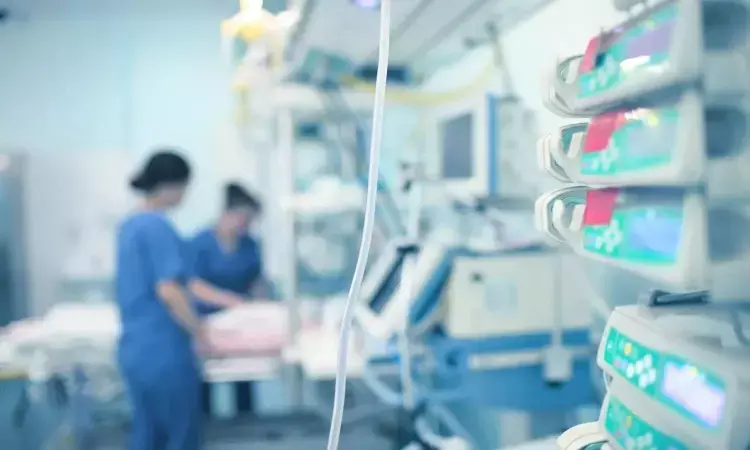- Home
- Medical news & Guidelines
- Anesthesiology
- Cardiology and CTVS
- Critical Care
- Dentistry
- Dermatology
- Diabetes and Endocrinology
- ENT
- Gastroenterology
- Medicine
- Nephrology
- Neurology
- Obstretics-Gynaecology
- Oncology
- Ophthalmology
- Orthopaedics
- Pediatrics-Neonatology
- Psychiatry
- Pulmonology
- Radiology
- Surgery
- Urology
- Laboratory Medicine
- Diet
- Nursing
- Paramedical
- Physiotherapy
- Health news
- Fact Check
- Bone Health Fact Check
- Brain Health Fact Check
- Cancer Related Fact Check
- Child Care Fact Check
- Dental and oral health fact check
- Diabetes and metabolic health fact check
- Diet and Nutrition Fact Check
- Eye and ENT Care Fact Check
- Fitness fact check
- Gut health fact check
- Heart health fact check
- Kidney health fact check
- Medical education fact check
- Men's health fact check
- Respiratory fact check
- Skin and hair care fact check
- Vaccine and Immunization fact check
- Women's health fact check
- AYUSH
- State News
- Andaman and Nicobar Islands
- Andhra Pradesh
- Arunachal Pradesh
- Assam
- Bihar
- Chandigarh
- Chattisgarh
- Dadra and Nagar Haveli
- Daman and Diu
- Delhi
- Goa
- Gujarat
- Haryana
- Himachal Pradesh
- Jammu & Kashmir
- Jharkhand
- Karnataka
- Kerala
- Ladakh
- Lakshadweep
- Madhya Pradesh
- Maharashtra
- Manipur
- Meghalaya
- Mizoram
- Nagaland
- Odisha
- Puducherry
- Punjab
- Rajasthan
- Sikkim
- Tamil Nadu
- Telangana
- Tripura
- Uttar Pradesh
- Uttrakhand
- West Bengal
- Medical Education
- Industry
Does vitamin B1 supplementation protect against kidney injury in patients with septic shock?

USA: A recent study assessing the role of thiamine supplementation for renal protection in septic shock found no statistical difference in the primary outcome of creatinine changes over time. The findings were published in the online issue of the American Journal of Respiratory and Critical Care Medicine.
The TRPSS trial further revealed that patients receiving thiamine had more ICU (intensive care unit)-free days, but no difference was noted in other secondary outcomes.
In patients with septic shock, kidney injury is common and leads to worse outcomes. It is suggested that mitochondrial resuscitation with thiamine (vitamin B1) may attenuate septic kidney injury. Thiamine is known to play critical roles in several biological processes, including glucose metabolism, oxidative stress reduction, and synthesis of nucleic acids. About 70% of critically ill patients might be affected by thiamine deficiency, and thiamine supplementation appears to decrease the vasopressor dose and increase lactate clearance.
Therefore, Ari Moskowitz, Harvard Medical School, Boston, Massachusetts, United States, and colleagues aimed to assess whether thiamine supplementation attenuates kidney injury in patients with septic shock in the TRSS (Thiamine for Renal Protection in Septic Shock) trial, a multicenter, randomized, placebo-controlled trial of thiamine versus placebo in septic shock.
The study's primary outcome was a change in serum creatinine between enrollment and 72 hours after enrollment.
The authors reported the following findings:
- Eighty-eight patients were enrolled (42 received the intervention, and 46 received a placebo).
- There was no significant between-group difference in creatinine at 72 hours (mean difference -0.57 mg/dL).
- There was no difference in receipt of kidney replacement therapy (14.3% versus 21.7%), KDIGO-3 acute kidney injury (54.7% versus 73.9%), or mortality (35.7% versus 54.3%) between thiamine versus placebo groups.
- Patients who received thiamine had more intensive care unit-free days (median 22.5 versus 0.0).
- In the thiamine-deficient cohort (27.4% of patients), there was no difference in rates of kidney failure (57.1% thiamine vs. 81.5% placebo) or in-hospital mortality (28.6% versus 68.8%) between groups.
"In the TRPSS trial, there was no statistically significant difference in the primary outcome of change in creatinine over time," the researchers wrote. "Patients receiving thiamine had more ICU-free days, but no difference in other secondary outcomes."
Reference:
Moskowitz A, Berg KM, Grossestreuer AV, Balaji L, Liu X, Cocchi MN, Chase M, Gong MN, Gong J, Parikh SM, Ngo L, Berlin N, Donnino MW. Thiamine for Renal Protection in Septic Shock (TRPSS): A Randomized, Placebo-Controlled Trial. Am J Respir Crit Care Med. 2023 Jun 26. doi: 10.1164/rccm.202301-0034OC. Epub ahead of print. PMID: 37364280.
Dr Kamal Kant Kohli-MBBS, DTCD- a chest specialist with more than 30 years of practice and a flair for writing clinical articles, Dr Kamal Kant Kohli joined Medical Dialogues as a Chief Editor of Medical News. Besides writing articles, as an editor, he proofreads and verifies all the medical content published on Medical Dialogues including those coming from journals, studies,medical conferences,guidelines etc. Email: drkohli@medicaldialogues.in. Contact no. 011-43720751


